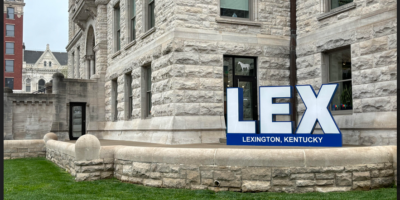Part of showcase of documentary films by H. Clay alum
By Danny Mayer
On June 12 and 13 (Saturday and Sunday), the downtown public library will hold a free viewing of six documentaries made by filmmaker Lucy Massie Phenix. A graduate of Henry Clay high school, Phenix will be in town for her 50 year high school reunion.
As an editor, director and producer, Phenix’s body of work is a wonderful example of how the medium of documentary film can be used to engage emotionally with politically and socially charged events. Her first work on documentary films, for the acclaimed 1971 Vietnam War documentary Winter Soldier, chronicled a war crimes panel held in Michigan at the height of the Vietnam War. Conducted by the Vietnam Veterans Against the War, the panel featured hundreds of soldiers documenting their own experiences and observations of U.S. war crimes in Vietnam. Though the panel was little covered by the press in the papers (though widely attended by journalists), the details of American war crimes have come to be an important document of recent American history—in large part through the continued popularity of the Winter Soldier documentary.
Phenix’s interest in documenting acts of struggle against social and human justice extends beyond the war in Vietnam. In her work on Word is Out (1977), she explored the stories of 26 gay and lesbian men and women. You Got to Move (1986) found Phenix recording stories of community activism in the south through the lens of the famous Highlander Folk School in Tennessee (which included civil rights icon Rosa Parks as a graduate), while even closer to home in Kentucky, Phenix edited Stranger with a Camera, the 2000 documentary that explored Canadian film-maker Hugh O’Conner’s 1967 murder in central Appalachia while he was filming a documentary on the region’s poverty.
But perhaps Phenix’s most dynamic interests have centered on the intersections of women and war. She is best known for editing The Life and Times of Rosie the Riveter, a 1980 documentary that looked at World War II through the lens of women’s participation on the home front. (Rosie the Riveter was a catch phrase for women during WWII who took up the slack in industrial—and wartime—production of goods by working in the factories while American men went off to fight in Europe and Asia.) The documentary is as much about the beginning of the modern women’s rights movement as it is about the specific story of women’s home front contribution to the American war effort.
Phenix again returned to the Vietnam War when she edited the 1998 documentary Regret to Inform. To my mind, Regret to Inform, which takes its name from the standard opening lines of telegrams informing spouses of the death of their significant others in war, is one of the best documentaries on the Vietnam War—or war in general, for that matter. The film follows director Barbara Sonneborn as she travels to Vietnam in search of the place where her husband, Jeff, had died in battle.
Only 24 years old when she received the “regret to inform” telegram in 1968, Sonneborn travels to Vietnam in the early 1990s. Her traveling companion and interpreter: a Vietnamese friend whose family and first husband were killed by U.S. troops, and whose second husband, an American serviceman, brought her to the United States and quickly divorced her, all but abandoning the Vietnamese refugee in a foreign country whose language she only barely knew. Through this frame story, Sonneborn weaves a variety of interviews with women from the U.S. and Vietnam who received, either literally or metaphorically, “regret to inform” messages. The story shows how powerfully the agonies of war transcend “sides.” When it comes to war, Sonneborn seems to say, we all lose out.
The first Gulf War author Anthony Swofford wrote in his nonfiction novel Jarhead that all war movies function as pornography. For the most part, he’s right, but maybe that’s because most war movies are either produced by men or (in the case of The Hurt Locker) written for a male audience. Regret to Inform, however, tells a radically different story of war. There is very little war porn here, though the film shows us plenty of burned out landscapes, a legacy of the insane amounts of pesticides dropped by the U.S. throughout the Vietnam War. And we see what happens, over twenty years later, to children born of parents—both U.S. and Vietnamese—who ingested those U.S. war chemicals. And while some may get off on James Bond type torture/interrogation narratives, such actions lose their luster when described, twenty years later, by an aging though still devastated female Vietnamese fighter tortured by U.S. backed South Vietnamese forces.
Ultimately, Regret to Inform is so powerful because it both escapes and doesn’t escape a war that officially concluded 35 years ago. Traveling to Vietnam two decades after the U.S. hastily left, Regret to Inform moves between coverage of the war and its lasting legacies. Wars may end on paper, but the documentary shows just how much they continue to leak—into the soil, into diverging lives and fractured families, into our offspring’s DNA—well after the helicopters get shipped home (or bulldozed into the sea, which happened during the Vietnam War). Like many great feminist works, this is not so much of a political stance as it is a bodily one. Women, after all, are the ones who raise kids after fathers die in wars; they are also the ones who bear children, who raise the orphaned kids, who later gestate the DNA-ravaged offspring, that are the inevitable brutal legacies of every war, without exception.
As we fight two wars under the leadership of a so-called anti-war president, as we continue to poison Mother Earth in the service of war aims, as our actions directly contribute to more Regret to Inform letters, this is a message we should be aware of—bodily. You will cry during Regret to Inform, but then again, you should.
—————————
Here is the calendar for the Phenix documentaries showing at the downtown library. All are free and open to the public: June 12: The Life and Times of Rosie the Riveter (9:00 AM); Cancer in Two Voices (10:30 AM); You Got to Move: Stories of Change in the South (1:30 PM); Don’t Know We’ll See (3:30 PM). June 13: Regret to Inform (1:00 PM); Word is Out (2:30 PM).
Many thanks to the Chevy Chaser, whose Neighborhood News section brought Phenix’s film showings to my attention.




Ned Bogie
Tell Lucy Hello wherever she is, we went to Cassidy together. bogie 9258486491